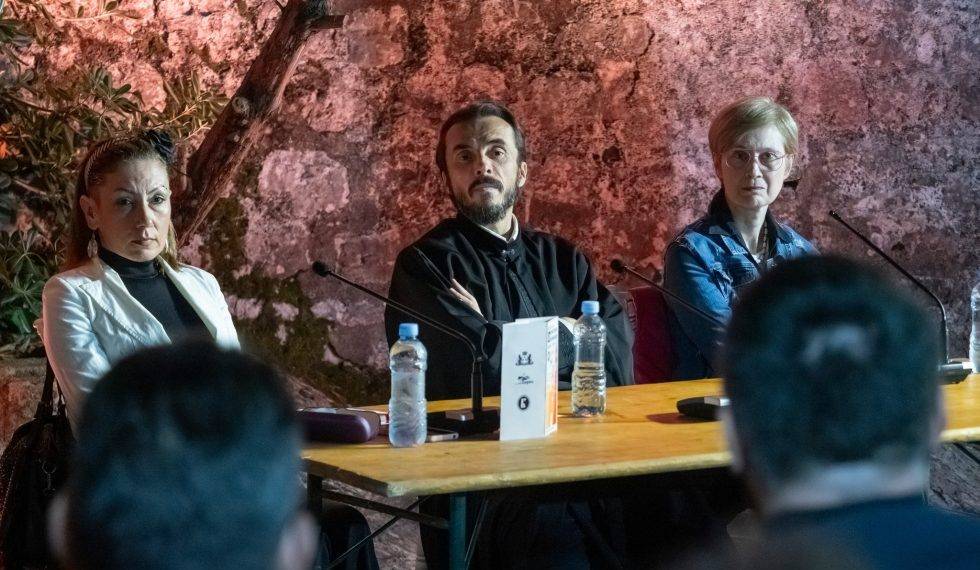
Festival "Cyrillic": In the age of artificial intelligence, it is necessary to create oases of creativity – video
The current topic of creation in the age of artificial intelligence was discussed at the seventh evening of the ninth edition of the Festival "Cyrillic" in Budva, in the area below the Citadel. Last night's program was attended by Presbyter Dr. Oliver Subotić, parish priest at the Church of St. Alexander Nevsky in Dorćol and an IT engineer, and Nina Savčić, a Serbian theorist of culture and media. The current and interesting topic of artificial intelligence, according to Presbyter Subotić, tests the limits of human creativity in the field of novel writing, proofreading and editing, translation, photography and other fields.
In the context of the expansion of the Internet, as Father Oliver emphasized, pioneering research was initiated by Sven Birkaerts, an American essayist and literary critic who in 1994 published the book “Gutenberg Elegies”, with the subtitle “The Fate of Reading in the Electronic Age”.
"At that time, hypertext emerged as a completely new form, since the Internet became a public network. You know that at first the Internet was a military network, designed so that communication could exist in the event of a nuclear war, later it moved to scientific laboratories, and today it has become a public network and something without which the functioning of civilization is not possible. In 1994, the Internet was still in its infancy, it was far from today's level, the bandwidth was very small, but that hypertext form, in principle, was the same as we have today. In fact, while we read that text, we do not go linearly through the content all the time, but jump from topic to topic. And Birkerts asked the question in what way does this change our perception and the possibility of delving into the depth of the text, as well as the possibility of our expression of thought. The question he asked at the time seemed a bit illusory and exaggerated, but time has proven him right," Subotić pointed out.
According to him, the big question is how we will manage in this whole story.
"I am not usually inclined to be gloomy, I like to realistically view the whole situation as it is and I am always optimistic as a Christian. But I am realistic in some projections and I think that we will still find a solution, but not on a global level. The pressure from the corporate and military spheres is formidable. On a micro social level, we can do a lot. At this moment in the field of creativity, we must worry first of all about defending our creative potential. We acquired it in childhood, because we welcomed modern technologies, but our children are in serious danger because they were welcomed by modern technologies. And we must be their best friends, by defending their creative potential. First, we must defend the space that is the closest space of the family, and that is our home, the second space is nature - a category that we must preserve at all costs and the third is sport, primarily team sports, because they force a person to thinks. We cannot make this world a paradise, it is impossible, but we can make it not hellish. Orthodox thinkers noticed this long ago, that this world is a desert, and we can at one point come to terms with it – and nothing to anyone, but we can say that it is a desert, we cannot reforest it, but we can create oases. Our task is to create oases of creativity, and these are our families”, concluded Father Oliver.
Cultural and media theorist Nina Savčić pointed out that many times throughout history, man has had the opportunity to confront something he invented, which could, as she said, go for both good and evil.
"Certainly, some guiding idea was to create something good and man has repeatedly known how to stop himself, because what was evil was evil to that extent, and we do not need to go beyond the example of the nuclear bomb. And then we, the people whose invention could threaten humanity, sat down and made an agreement and are trying to still respect that agreement to some extent. We have broken many agreements, and for now we are respecting this one, after certain, of course, negative steps that are, I think, a stain on the face of man. With artificial intelligence it is different, in fact drastically different, because it is so seductive and is so incorporated into our lives and helps us so much that we certainly do not know where the limit is. Even if we knew how to say where the limit is, the big question is who would accept it. Which means that as a species we need to sit down again and agree that we will not do that." misuse. So it seems to me that this dystopian possibility is real, in what future – we don’t know,” Savčić said.
She pointed to Max Tegmark and his book “Life 3.0: Being Human in the Age of Artificial Intelligence.” As she emphasized, Tegmark wanted to pause the development of artificial intelligence for six months a few years ago.
"This idea was signed by about 50 thousand scientists and researchers, people who are really involved in it and are deeply involved in the development of artificial intelligence. The reason for such an appeal was to create good regulation, because artificial intelligence is advancing rapidly and its products are too seductive, in many areas it helps us a lot and we are building it more and more. And regulation is not going at the same speed as the development of artificial intelligence, and in the end it was not accepted. At the time when he was asked, it was about four years ago, he said that a pause was necessary and that the moment is now. I consider Tegmark to be an exceptional scientist and he talked about how we were once homosapiens, and that we are transitioning into another species, that we have become people not of information and knowledge, but that we should also become in due time a species that goes after experiences and that this is what separates us. So, artificial intelligence has already become a superior subject. I like it it is a subject, I don't have to call it a being or some biosphere, technosphere... And unfortunately it is a subject, no longer an object. So, it has become superior and capable of a wide range of actions. However, what it lacks is experience. In that sense, we are different and that is what is still on our side - the experience of all those actions, experiences that are impossible for artificial intelligence to follow", Savčić emphasized.
Despite the omnipresence of artificial intelligence in everyday life, the interlocutors of the festival evening emphasized the importance of preserving human deep thought, experience and spirituality as the foundation of creativity. It is precisely this potential - to imagine, create and empathize - that, regardless of technological challenges, still makes us irreplaceable in a time when the boundary between humans and algorithms is becoming increasingly difficult to discern.
The Festival "Cyrillic" is organized by the National Library "Miroslav Luketić" Budva and the Association of Publishers and Booksellers of Montenegro, with the support of the Municipality of Budva and the Tourist Organization of the Municipality of Budva. This year's edition runs until September 17.
VII Evening of the IX Festival in Cyrillic "Creation in the Age of Artificial Intelligence" – video
Source: National Library "Miroslav Luketić" Budva
PHOTOS
RELATED ARTICLES

Calendar for January 21 Venerable George the Chozevit
A native of Cyprus. His older brother, Iraklid, went to the Holy Land and...
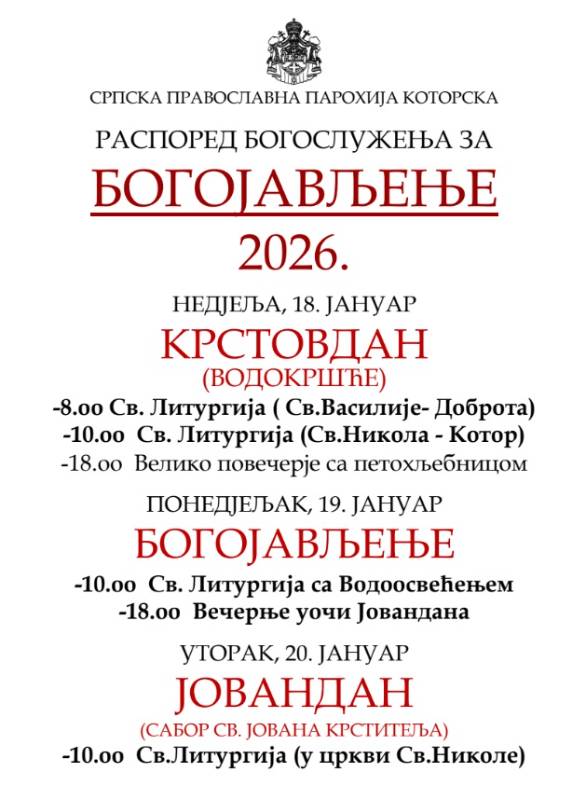
SCHEDULE OF THE EPIPHANY DAY 2026
SUNDAY, JANUARY 18EPHIPHANY DAY (EPHIPHANY)-8.oo Holy Liturgy (St. Basil -...
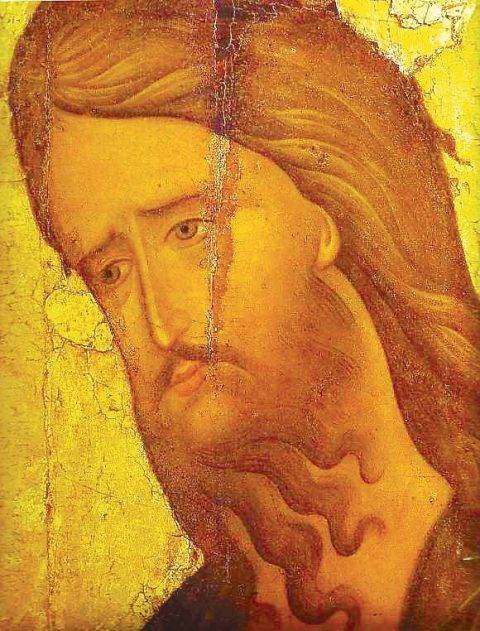
Calendar for January 20 The Feast of Saint John the Baptist – John’s Day
“The greatest born of women” (Mt. 11:11) is celebrated several...


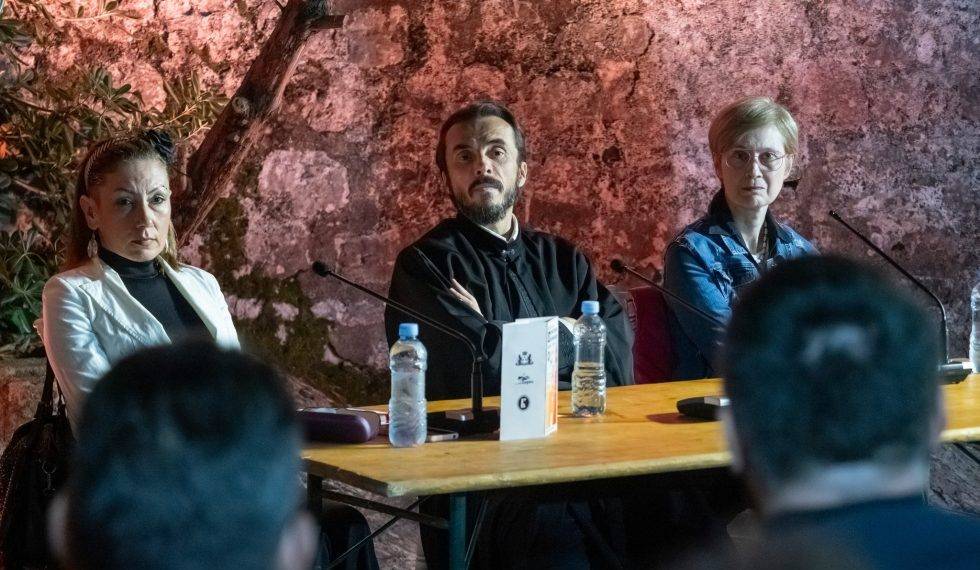

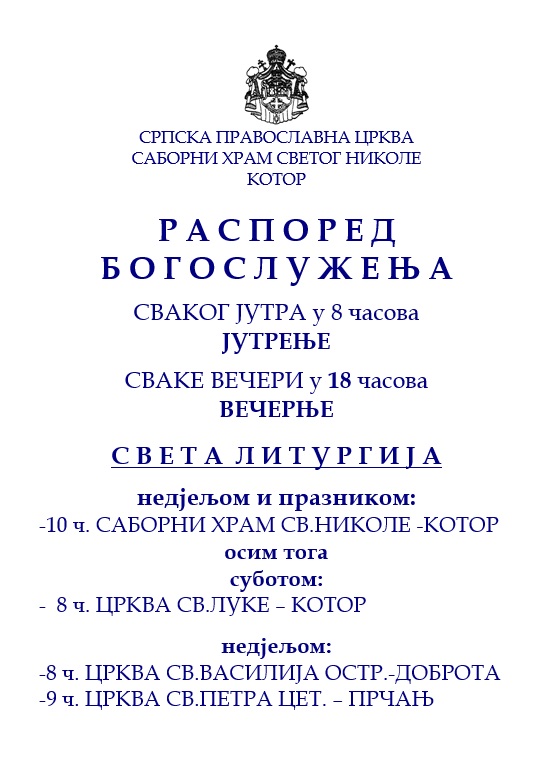
.png)